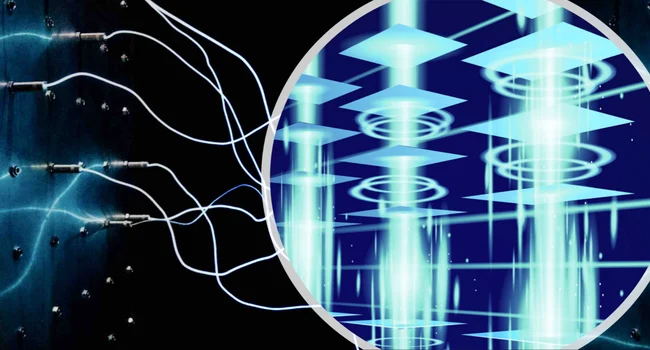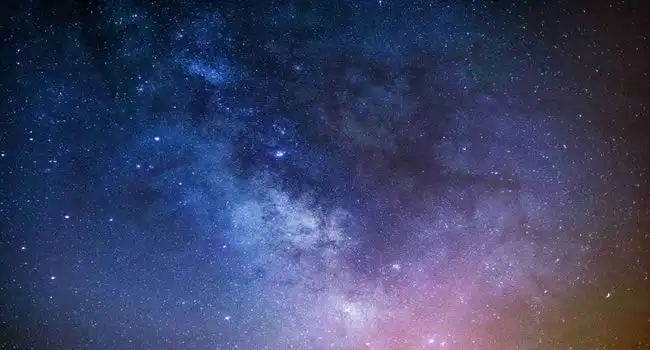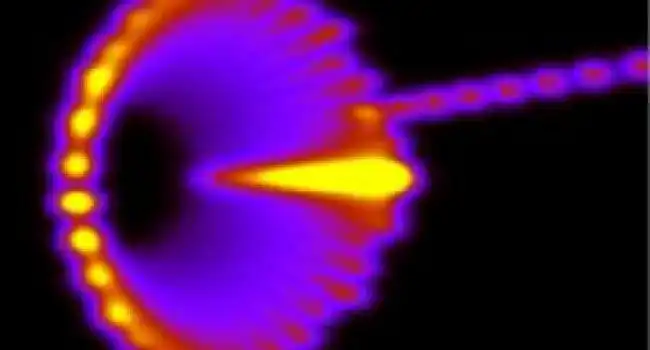Throughout history, humanity’s curiosity has been piqued by the mysteries of our universe’s origins. Astronomers, physicists, and cosmologists have proposed numerous theories, striving to explain the birth and evolution of the cosmos. From ideas that have stood the test of time and rigorous scrutiny, like the Big Bang Theory, to more speculative ones weaving through the intricacies of advanced mathematics, such as Brane Collisions in String Theory, our understanding has continuously evolved. In this list, we’ll explore the top ten theories about the origin of the universe, journeying from the well-established to the cutting-edge
10- Static Universe Theory

Photo Credit: Space
Throughout the history of cosmological thought, one of the initial hypotheses about the universe was its static nature. This theory postulated that the universe has always been as it is now, without any beginning or end. Philosophically, the notion was appealing; the universe, without any dynamism, has a consistent structure and fabric. Albert Einstein, one of the greatest minds in history, initially endorsed this perspective. He even incorporated a factor called the ‘cosmological constant’ into his equations of relativity to counterbalance the effects of gravity, ensuring the universe remained static.
As observational technology progressed, this theory began to face challenges. Edwin Hubble’s observation of the redshift of galaxies provided the first substantial evidence that galaxies were moving away from each other, implying an expanding universe. Moreover, the discovery of the cosmic microwave background radiation was another nail in the coffin for the static universe model. Today, with an abundance of contrary evidence, this theory has mostly faded from mainstream scientific discourse.
9- Plasma Cosmology

Photo Credit: NASA
Hannes Alfvén, a Swedish electrical engineer and Nobel laureate, put forth the Plasma Cosmology theory. This theory pivots on the idea that the universe’s primary architects are not the gravitational forces but electromagnetic ones. Plasma, which is essentially ionized gas and is abundantly present in the universe, plays a pivotal role in this cosmological model. In Plasma Cosmology, phenomena like galaxy formation, cosmic rays, and even the universe’s large-scale structure, are profoundly influenced by plasma dynamics and associated magnetic fields. The concept further suggests a universe that does not necessarily begin or end but remains in a perpetual quasi-steady state. However, as romantic as the idea sounds, it has struggled to gain traction in mainstream cosmology. Many of its predictions starkly contrast the observations, particularly those related to the cosmic microwave background radiation, which is better explained by the Big Bang theory.
8- Cyclic Universe Theory

Photo Credit: Universe Today
The universe’s origin and destiny have been topics of profound interest. The Cyclic Universe Theory postulates a continually repeating life cycle for the universe. Instead of one Big Bang and a subsequent unending expansion, this theory suggests that there are multiple cycles of Big Bangs, expansion, eventual contraction, and Big Crunches. Each ‘end’ begets a new beginning. Inspired by certain solutions to Einstein’s equations, this idea visualizes the universe as a phoenix, continually regenerating from its ashes. Modern variants of the Cyclic Universe, often rooted in string theory or brane cosmology, suggest that our universe’s collisions with other ‘brane’ universes could cause these repeating cycles. However, concrete evidence that can definitively endorse this cyclic behavior remains yet to be found.
7- Multiverse Theory

Photo Credit: Sociable
Often sounding like science fiction, the Multiverse Theory is one of the most intriguing concepts in cosmology. It proposes that our universe, vast as it seems, is just one bubble in an almost incomprehensibly vast multiverse, a sea of countless other universes. Some of these universes might have physical laws, constants, and dimensions starkly different from ours. The idea finds roots in quantum mechanics, especially in the many-worlds interpretation, and in string theory. It also offers a solution to the fine-tuning problem, suggesting that with infinite universes, it’s not surprising that at least one, like ours, has conditions perfect for life. Despite its allure, the Multiverse Theory faces significant scientific challenges, mainly because of the difficulty in empirically testing or observing these supposed other universes.
6- Quantum Fluctuation Model

Photo Credit: Resonances Science
In the bewildering realm of quantum mechanics, the vacuum isn’t truly empty. It teems with virtual particles and antiparticles popping into existence and then annihilating in extremely short timeframes. The Quantum Fluctuation Model of universe origin posits that one such random fluctuation could have escaped annihilation, expanded under its steam, and evolved into our universe. This seemingly bizarre concept implies that the grandeur of our universe could emerge from a minuscule, random quantum event. This theory ties the macrocosm, our universe, with the microcosm, the world of quantum mechanics, in a deeply profound manner. However, while theoretically elegant, gathering empirical evidence for this model remains a formidable challenge.
5- Tired Light Hypothesis

Photo Credit: Science Times
Before the acceptance of the Big Bang Theory, the redshift of distant galaxies needed an explanation. The Tired Light Hypothesis emerged as one such attempt. It postulated that as light travels vast cosmic distances, it loses energy, ‘tiring’ out, leading to its observed redshift. If correct, this would imply that the universe isn’t expanding; the light is just losing energy. However, this hypothesis struggled to explain many observed phenomena, like the uniformity of the cosmic microwave background radiation. The predictions of the Tired Light model were in conflict with observational data, and over time, as the Big Bang Theory gained more empirical support, this hypothesis lost its foothold in the cosmological community.
4- Oscillating Universe Theory

Photo Credit: Universe Today
Like the Cyclic Universe Theory but with distinct differences, the Oscillating Universe Theory posits a universe that expands and then contracts, but these oscillations have a distinct beginning and, potentially, an end. After each contraction, a subsequent expansion occurs, possibly triggered by another Big Bang-like event. This rhythmic breathing of the cosmos, expanding and contracting, is akin to a cosmic heartbeat. The primary challenge for this model is to ascertain what mechanisms would reverse a cosmic expansion and lead to a contraction. Moreover, current observational data, especially concerning the observed accelerated cosmic expansion, has made this theory less favored in contemporary discussions.
3- Big Bang Theory

Photo Credit: Times of India
Undoubtedly the most widely accepted theory regarding the origin of the universe, the Big Bang Theory asserts that the universe began as a singularity, a point of infinite density and temperature, approximately 13.8 billion years ago. This singularity began expanding rapidly in a hot explosion, leading to the universe’s current ongoing expansion. This theory draws its primary evidence from the observed redshift of distant galaxies (indicating that they are moving away from us) and the cosmic microwave background radiation, a faint glow permeating the universe that is believed to be the cooled remnant from the initial fiery moments of the Big Bang. Over time, as the universe expanded and cooled, matter coalesced to form galaxies, stars, planets, and eventually, life as we know it. This theory not only explains the universe’s origin but also provides a framework for understanding its evolution and potential fate.
2- Inflationary Universe Theory

Photo Credit: Future Learn
An extension to the Big Bang Theory, the Inflationary Universe Theory proposes that just after the Big Bang, the universe underwent an exponential expansion at a rate much faster than the current observed expansion. This rapid inflation stretched and smoothed out any irregularities, which helps explain the remarkable uniformity of the cosmic microwave background radiation. It also addresses several puzzles not fully explained by the standard Big Bang model, such as the horizon problem and the flatness problem. Inflation is driven by a hypothetical scalar field called the inflaton. Recent observations from the cosmic microwave background and the distribution of galaxies support the idea of inflation, but the exact details, such as what triggered inflation and how it stopped, are still subjects of research.
1- Brane Collisions in String Theory

Photo Credit: NASA
At the intersection of quantum mechanics and relativity lies string theory, which postulates that the most fundamental components of the universe are not point particles but tiny, vibrating strings of energy. These strings can vibrate at different frequencies, leading to various particles. While string theory is primarily a candidate for unifying the forces of nature, it has cosmological implications. Some variants of string theory posit that our universe is a 3-dimensional “brane” floating in a higher-dimensional space. The collision of such branes could have triggered the Big Bang. This concept provides a pre-Big Bang scenario and suggests our universe’s birth might be cyclic, with branes colliding multiple times over eons. While incredibly compelling, the theory remains mathematically complex, and experimental validation has proved challenging, making it a frontier area in cosmology and theoretical physics.
These theories collectively reflect the deep human curiosity about our universe’s origins. They range from well-supported mainstream ideas, like the Big Bang, to more speculative ones at the cutting edge of theoretical physics. Each offers a unique perspective, and as technology and observations advance, our understanding of the universe’s inception will undoubtedly become clearer.


